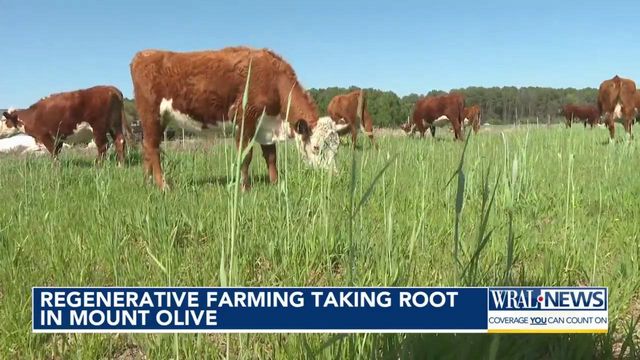Regenerative farming: Old soil-focused practice saves Mount Olive family farm
An old soil-rich farming practice called regenerative farming is making a comeback and having a positive impact on a family farm in Mount Olive.
Agriculture is North Carolina's number one economic driver, bringing more than $90 billion to the state. Despite those numbers, N.C. ranks number two for farmland loss in the United States, according to the American Farmland Trust.
North Carolina could lose more than one million acres of farmland by 2040. That's why some farms, like locally-owned KH Farms, are turning to regenerative farming, a soil-based practice that can improve the health of crops and livestock and could end up saving the family farm.
Karen Scalf said raising cattle is in her blood.
"My mom and dad started it in 1949. This is our 75th year in operation," said Scalf, who raises Hereford cattle and Jersey dairy cows on 200 acres of land near Mount Olive.
For decades, Scalf tended KH Farms as a traditional farmer.
"There was literally no profit in it," she said. "You were always using what you made the year before to farm again the next year."
Six years ago, KH Farms turned to a practice called regenerative farming, and she hasn't looked back.
"By going to regenerative farming and returning to managing the soil with mother nature we reduced our expenses by 30%, even up to 40%," she said.
Regenerative farming is a land management philosophy emphasizing soil health and its impact on the entire ecosystem.
Regenerative farmers also don't use fertilizer or pesticides, or till plants, which Scalf said produces healthier soil and grass, healthier cattle and better beef.
"It's very dark," Scalf said of the soil. "It holds together and has a nice, earthy smell to it, and there are a lot more microbes in the soil and it produces healthier grass."
Farming without chemicals saved Scalf time and money, and she said it could help other small farms stay in business.
"The cattle, the fertility would be higher, they have fewer parasites," she said. "This will keep them on the land."
Regenerative farming also has ecological benefits. Healthier soil can hold more water, improving flood and drought resilience and recharging groundwater levels.
A 2020 study found that regenerative farming has a lower carbon footprint than conventional farming.
"Would the Karen of 10 years ago believe what the Karen of now is doing? Probably not," Scalf said. "You have to see it to believe it."













